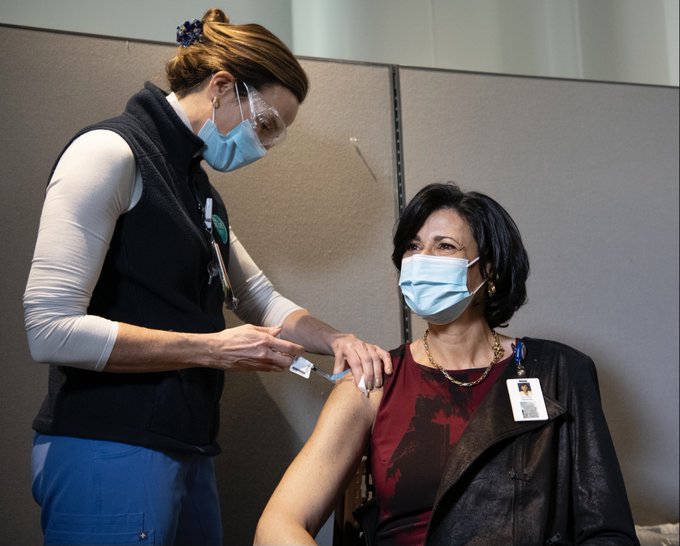Relationships and Going Places
Jo Freeman: There’s Plenty To Do at the RNC – If You Have the Right Credentials
by Jo Freeman
Every national nominating convention has plenty of auxiliary events, some authorized, some not. Getting space can be a challenge; getting the word out even more so. But they do it nonetheless. Press were given a RNC 2024 Master Event Calendar, which was updated a few days later. Events began on Sunday and ended on Thursday. The actual convention sessions were just one item on the list. The calendar said if an event was Open or Closed to press, and also whom to contact to register. I’m going to describe some of the events, including a couple I went to, and a couple I was turned away from.
Since my focus is on women, I obviously wanted to go to those events – if I could.
The National Federation of Republican Women is the largest grassroots Republican women's organization in the country with hundreds of clubs. Founded in 1938, its members made the phone calls and knocked on the doors that elected Republican candidates for decades. It’s Tuesday luncheon featured Arkansas Governor Sarah Sanders. The Master Calendar said it was SOLD OUT and they wouldn’t let me in. I was able to get into their lounge at the Fiserv Forum Wednesday evening, where I was repeatedly asked if I was a member, and if not, would I join. “I’m press,” I said. “I can’t join anything partisan.” I then said: “What brings you here?” On hearing that, finding anyone willing to chat with me was like pulling teeth.
Moms for Liberty met in a concert hall that afternoon. I had pre-registered, and I got in. From high in a balcony seat I listened to several people talk about the evils of transgenderism. It’s webpage says WE BELIEVE Power Belongs to the People. Sound Familiar? With a focus is on parental rights, it wants to “STOP WOKE indoctrination.”
Tuesday I went to “The New Mavericks” reception co-hosted by the Black Republican Mayors Association and the Georgia Republican Party. They honored Sen. Tim Scott, four Congressmen and two Georgia delegates – all male. There was only one mayor on stage, from Aurora, IL. The chair of the Georgia Republican Party was the one white man on the stage. At that event, women served; they didn’t speak. The RNC reported that 55 delegates to the 2024 convention are Black, up from 18 in 2016.
I missed the Independent Women’s Forum toast to “Women Who Make Our Country Great” because I went to Convention Fest: The Official Delegate Experience, which was held in the streets outside the Fiserve Forum and Baird Hall as well as some space inside Baird. To get to that one you not only needed a credential of some sort, but a USSS pass (which I have).
Concerned Women for America parked its pink bus across from the Baird Center the week before the RNC. No one was home. When Convention Fest opened on Tuesday afternoon, they set up a pink tent, from which its leaders preached to whomever passed by. It calls itself “the nation’s largest public policy women’s organization” but its focus is evangelical Christian. The slogan on the side of its pink bus captures this emphasis: “She Prays, She Votes.” A prayer precedes each sermon.
 CDC Statement on ACIP Booster Recommendations: Dr. Rochelle Walensky
CDC Statement on ACIP Booster Recommendations: Dr. Rochelle Walensky
Today, CDC Director Rochelle P. Walensky, M.D., M.P.H., endorsed the CDC Advisory Committee on Immunization Practices’ (ACIP) recommendation for a booster shot of the Pfizer-BioNTech COVID-19 vaccine in certain populations and also recommended a booster dose for those in high risk occupational and institutional settings. The Food and Drug Administration’s (FDA) authorization and CDC’s guidance for use are important steps forward as we work to stay ahead of the virus and keep Americans safe. This updated interim guidance from CDC allows for millions of Americans who are at highest risk for COVID-19 to receive a Pfizer-BioNTech COVID-19 booster shot to help increase their protection. more »
 How Rape Affects Memory, and Why Police Need to Know About That Brain Science
How Rape Affects Memory, and Why Police Need to Know About That Brain Science
Carrie Hull is now a consultant for police departments, and part of her work involves advocating for the adoption of a technique known as Forensic Experiential Trauma Interviewing, or FETI. The training can help law enforcement learn how to ask questions differently: with empathy, patience and an informed understanding of how a traumatized brain makes memories and recalls them. Training in the technique is available through an online course, but it’s not a mandatory requirement for most police departments. People who take Hull’s course learn specific strategies for helping someone resurface a relevant memory that he or she may not have had access to when they first walked into the interview room. Hull said FETI discourages counterproductive practices such as paraphrasing, changing the victim’s words, interrupting or giving advice. Hull said the overarching goal of trauma interviewing is to first “collect the dots, then connect the dots.” In other words, simply interview the victim about what happened. more »
 Jo Freeman's Review of "Frankly, We Did Win This Election" By Michael C. Bender
Jo Freeman's Review of "Frankly, We Did Win This Election" By Michael C. Bender
Jo Freeman Reviews: This “inside story of how Trump lost” the 2020 election shines a light on his entire presidency. Indeed, he filed papers for his re-election campaign the day he was inaugurated in 2017, so the two were never completely separate endeavors. TrumpWorld was a hornets’ nest. Everything revolved around the King Bee, as the worker bees tried to push, kick and sting each other to get close. ..." more »
 Immediate Release: Statement by Secretary of Defense Lloyd J. Austin III on the 10th Anniversary of the Repeal of ''Don't Ask, Don’t Tell'' SEPT. 20, 2021
Immediate Release: Statement by Secretary of Defense Lloyd J. Austin III on the 10th Anniversary of the Repeal of ''Don't Ask, Don’t Tell'' SEPT. 20, 2021
"So, for those who believe they were unjustly discharged or retain an error in a service record, please contact your military department's Board for Correction of Military/Naval Records or Discharge Review Board. As Secretary of Defense, I am committed to improving diversity, equity, and inclusion across the force. It makes us more representative of the nation we defend. It makes us wiser. And, without question, it makes us stronger. On behalf of the entire Department, I thank our LGBTQ+ service members -- and your families -- for the service you render each and every day." more »






